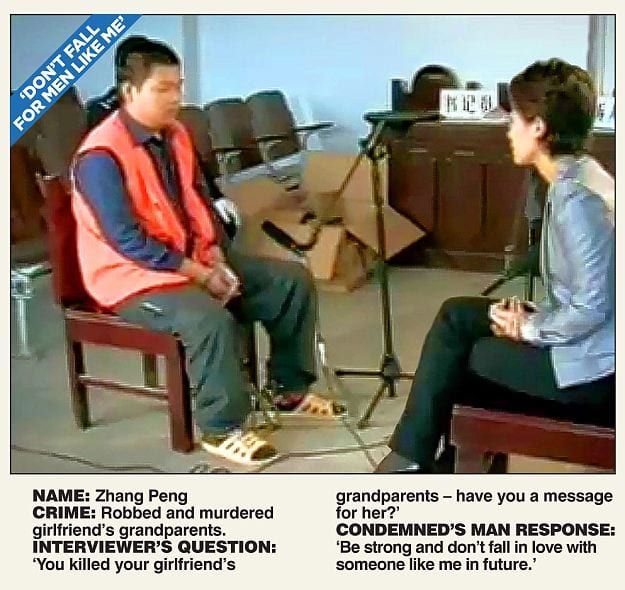It’s not the first time when I see some foreign coverage on China and sigh how the views are distorted. Unlike the stereotype of Chinese who will locate the writer and revenge with martial arts, I’m going to explain why such bias exists and offer my perspective as a Chinese on Interview Before Execution, where criminals sentenced to death are interviewed with questions on their life and crime right before their execution.
Part of this program, however distasteful it might sound, is going on air on the BBC’s This World series today. What’s being discussed on the British media now, is the reason why this program has been popular in China for five years, China’s enormous yet mysterious number of executions, and the possibility of abolishing death penalty in China.
 Source: The Daily Mail
Source: The Daily Mail
First, regarding its popularity, Interview Before Execution is aired in China on a provincial station, Henan TV, instead of the national station CCTV (China’s Central Television Station). Hence, its viewership is limited to Henan province, which is 40 million out of the 100 million Henan residents. My friends in other parts of China and even my parents who are loyal TV viewers, have never watched it. 40% viewership on Saturday evening prime time of a law-related program instead of any soap opera, does show its popularity in Henan, but not as extensive as the Daily Mail depicts.
I searched it on Weibo (the Chinese Version of Twitter) which offers a pool of public opinions, and unsurprisingly found out the emphasis of the Chinese audience to be quite different. Take one of the most famous interview cases – the gay murderer of his mother – as an example, the response on Weibo is very mixed. Most Chinese do like it, because it reveals the tenderness of human heart even among the most notorious criminals, which corresponds to the fundamental Chinese philosophy that “man’s nature at birth is good”. Besides, the regret expressed by the murderer teaches Chinese not to be irrational and not to commit crimes. Such lessons are coherent with the principles of the Chinese media system, which is to educate the public and elevate public taste. And such principles originate from China’s long history of learning from history and stories of the others as a mirror to oneself.

There are anecdotes on the Internet that some people retreated from such irrational action as murder after watching this program. This culture apparently is not to the knowledge of or appreciated by most westerners, which is the root why bias is prevalent. Though many Chinese admire the hostess’s bravery to expose homosexuality, which remains highly controversial and secretive in Chinese society, criticism, however, does exist and centers on the hostess for being merely curious instead of genuinely concerned about homosexuality. I would rather say that the curiosity exhibited by the hostess was more of the representation of the audience instead of herself.
It is questionable that this program really delivers the message that China executes too many people, and whether these people deserve death penalty, but this notion will certainly spread across China as the number of viewers increase. At present, as the judge interviewed by the BBC says:
“Since the death sentence for criminals is itself a violent act, then we should abolish it. However, I don’t think our country is ready yet.”
The BBC reports that though China’s number of execution each year remains a secret, the number has already dropped 50% after all executions had to be reviewed by the Supreme Court since 2007. Apart from these figures, I believe since Interview Before Execution must have been approved from Chinese elite officials in order to be broadcast in China as the first show featuring to-be-executed criminals and China’s controversial death penalty, and for being broadcast abroad as explanation of China’s legal system, this itself is a signal that China is transitioning.

Thanks for a very interesting post. Struggling as an outsider to see a society through its own lens, or conversely being an insider struggling to understand how and why outsiders see it the way they do, is not easy — but you have offered some very useful insights.